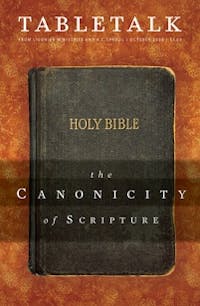
Request your free, three-month trial to Tabletalk magazine. You’ll receive the print issue monthly and gain immediate digital access to decades of archives. This trial is risk-free. No credit card required.
Try Tabletalk NowAlready receive Tabletalk magazine every month?
Verify your email address to gain unlimited access.
The question of canon, like the question of law, is one of authority. We who are Reformed spend a great deal of time and energy speaking about God’s sovereign power. God’s power is more than worthy of our attention and study. We ought to be bowled over, blown away by that power. It, like His law, is something we ought to meditate on. His power, however, is intimately connected to His kingship, His rule. God is not only sovereign in power, but is sovereign in authority. Consider how swiftly Paul moves between the two in Romans 9: “What shall we say then? Is there injustice on God’s part? By no means! For He says to Moses, ‘I will have mercy on whom I will have mercy, and I will have compassion on whom I have compassion’” (vv. 14–15). Here God affirms His sovereign authority. There is no law above Him to which He must submit, determining to whom He must show mercy. Next, however, we turn to His power. “So then it depends not on human will or exertion, but on God who has mercy. For the Scripture says to Pharaoh, ‘For this very purpose I have raised you up, that I might show my power in you and that My name might be proclaimed on all the earth.’ So then He has mercy on whomever He wills, and He hardens whomever He wills” (vv. 17–18).
Then Paul turns back to the question of authority: “You will say to me then, ‘Why does He still find fault? For who can resist His will?’ But who are you, O man, to answer back to God? Will what is molded say to its molder, ‘Why have you made me like this?’ Has the potter no right over the clay, to make out of the same lump one vessel for honored use and another for dishonorable use?” (vv. 19–21). The two are inseparable. God has all power because He has all authority. He has all authority because He has all power. When we sin we foolishly fight against both.
We, His creatures, are willing to submit only to those standards that we have first accepted. This concept came to us in America through the social contract philosophy of Rousseau, Locke, and Paine. We have bought the lie that we need only to submit to that which we have agreed to submit to. Consider, for instance, the oxymoronic, and perhaps just plain moronic, notion of “making Jesus Lord of your life.” While it is right and proper that we ought to submit to the reign of Christ, He has been Lord of our lives, and even the lives of those outside the kingdom from the moment He ascended to His throne. We don’t make Him Lord, we recognize that He is Lord.
Following quickly on the heels of social contract theory is the birth of the first truly American philosophy — pragmatism. Here we determine that we will submit only to “that which works.” Our law is goal-oriented, rather than justice-oriented. This system has its own glaring problems. How, one has to ask, do we determine what we mean by “works?” That is, what is the goal? What are we aiming for? With no transcendent law, there is no transcendent end, and we are left still under the sun, chasing the wind. And we chase it still.
Even within the church we have embraced an understanding of ethics steeped in pragmatism. We are willing to submit to God, only insofar as we are able to understand His wisdom. Why, for instance, would God not want women to serve as elders and pastors if He has so gifted them? Why would God want me to stay married when I’m so miserable in this life? Why would God not want me to eat this fruit that is pleasing to the eyes and desirable to make one wise? God is our Father, and as such He is utterly free to declare, “Because I said so.” His law is grounded not in what it does for us, far less in what we understand that it does for us. His law is grounded in who He is.
When Jesus tells us to seek first the kingdom of God and His righteousness, He is commanding that we must set aside our pragmatism. He is telling us that it is not up to us to decide what will “work best.” He is commanding us to set aside our own canons and submit to the wisdom of God. The things that we worry about, He reminds us, are things that our Father has already taken into consideration. He knows that we need food, drink, and clothing. He knows better still that we need to have as our meat and our drink to do the will of God.
Faith means believing God. When we believe Him, we submit to Him. His wisdom is not found in our own thoughts, our own strategies. His wisdom in found in His Word. Our calling then is simple enough — to fear Him and obey all that He commands. And because we fail at this calling, our calling is likewise that we would both repent and believe the Gospel. He has provided the way into His kingdom. He has given us our marching orders. Our Father has spoken. May He in turn bless us with ears to hear His Word, that we might walk in His way.
